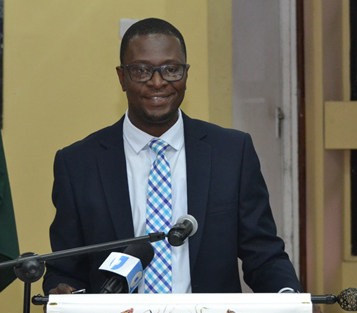Child abuse victims are oftentimes left on their own to deal with the severe trauma of their experiences and even families believe they can just `bounce back’ without any long-term impacts.
This was one of the themes discussed at a forum at the University of Guyana’s (UG) Turkeyen campus on Tuesday. The session was hosted by UG in association with ChildLink.
ChildLink, a Non-Governmental Organisation, works toward the protection of children against abuse and exploitation, including physical, sexual and emotional abuse, neglect and commercial exploitation, and aims to strengthen protection networks, systems, policies and approaches for further impact on the cause.
“Trauma Stories, Acting in, Acting out”, is the final in a series of four position papers that ChildLink has produced to highlight the wide effects of child abuse, Chairman of ChildLink, Kosi John explained.
In 2016, the first position paper, “Challenges of Institutional Care of Children” was released, followed by another in 2017 on “The Series of Child neglect”, and the third in 2018, named “Cries in the Dark: The Effects of Child Sexual Violence.” These papers can be accessed on the ChildLink’s website under the Child Rights Alliance (CRA) programme.
“There are 4,000 reported child abuse cases reported on an annual basis,” he reported. He added that the organisation’s programmes are focused on strengthening families and communities, including educating them on prevention of violence and abuse of children. “Traumatic experiences that children experience as a result of abuse is not yet recognised and treated, and families are expecting children to bounce back, seemingly assuming that it has no long term effects,” he said.
“For real change to occur, the body needs to learn that the age has passed and live in the reality of the present. Thus, a massive educational campaign needs to be embark upon to every person, particularly the young. It’s a national issue which concerns everyone and we can only rid our nation of this scourge if everyone assumes responsibility for the actions of others. We can no longer stand silently and remain uninvolved. We need to break the silence and exhibit zero tolerance for acts of violence and we must also promote in our society, a culture of non-violence and respect for human rights,” John concluded.
After the overview by John, researcher and author of the paper, Oluatoyin Alleyne, gave a report on the findings of her research.
In her presentation, Alleyne gave a summary of her research process, explaining her utilisation of the interview method. She interviewed three categories of persons: children who experienced sexual abuse, children who suffered physical abuse and children who endured sexual abuse, whose cases were prosecuted.
Interviews were held with the children in the first and second categories, while the parents of the children from the last category were interviewed. This was done, according to Alleyne, because those children were younger when the abuse would have occurred and there was a great risk of re-traumatisation.
The interviews were said to have been conducted over a four-week period, with 17 individuals. Nine of the interviewees were children, while eight were adults. The children were interviewed together but also had separate sessions, while the adults interviewed were all mothers of the victims.
Alleyne then related some of the negative impacts which abuse had on the victims who were interviewed during the research. “All of the victims of sexual violence, at one time blamed themselves for the abuse, while some of the victims (of) physical (abuse) also blamed themselves. Others feel that perpetrators of the violence hate them,” she commented.
Alleyne then made mention of a comment made by one of the survivors, who told her, “They blame me, and sometimes I blame me too, because if I wasn’t friendly with him, it couldn’t happen.”
She went on to explain the results and effects of traumatic experiences. “Without understanding the ramifications of traumatic experiences, children are left to explore and cope with their horrific exposure to traumatic experiences, which is disempowering and as a result, many traumatised children have learned to be submissive in their interaction with others,” she explained.
The national statistics, compiled by the Childcare and Protection Agency, confirmed that abuse of children, both sexual and physical, starts from zero to three years old and data indicates that sexual abuse is very high in the country.
It was also reported that while the report doesn’t address verbal abuse or verbal neglect, both themes emerged during the research, thereby highlighting the need for research to explore possible links between how verbal neglect and abuse correlate to the vulnerability of children and sexual abuse in the society.
The research also included troublesome behaviour or signs of trauma, some of which are: abrupt changes in relationships, like sudden disinterest in favourite people; becoming detached and withdrawn; sudden changes in behaviour and moods, especially anxiety, depression and thoughts of suicide; and dependency on alcohol and drugs.
Four of the victims, according to Alleyne, were disappointed in their mothers’ initial reaction when first learning of the abuse. One child related that she was constantly reminded by family members of the sexual abuse, while another said that her mother didn’t believe her. Regardless of that, all the victims still expressed fierce love for their mothers.
One of the children reported that the matter was before the police but the perpetrator is in hiding, while the remaining three couldn’t tell if the perpetrators were reported or if they were charged.
Alleyne also said that four mothers of the sexual abuse victims, whose matters have been through the court system, reported that they believed their daughters as soon as they were told of the abuse. In two of the cases, the victims reported the abuse as soon it happened, while another disclosed it after being questioned by their mother, and one mother walked in while the child was being abused.
Of the perpetrators in the above mentioned four matters, a father, a step brother and two uncles are currently serving prolonged jail sentences.
In relation to the victims of physical violence, Alleyne told listeners that only one of the perpetrators faced the courts and the matter ended without him being sentenced.
The cases of physical abuse led to at least two out of the five children interviewed being involved in deviant behaviour as a matter of retaliation.
Two of the victims from the same family were taken away by the state after it was discovered that they were abused by both of their parents, who are separated.
Alleyne encouraged those in attendance to listen to what children have to say and report cases of child abuse to the authorities, in a move to prevent increases to and eventually stop child abuse.
Part of the audience










